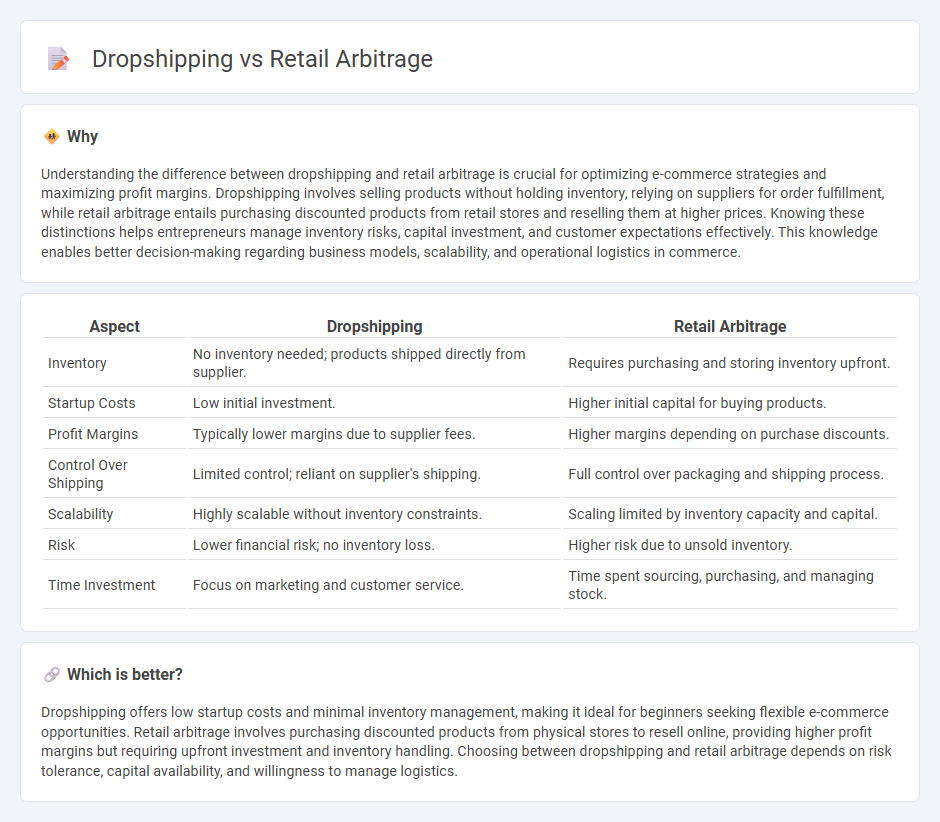
Dropshipping and retail arbitrage are two popular e-commerce business models with distinct operational strategies. Dropshipping involves selling products directly from suppliers without holding inventory, while retail arbitrage requires purchasing discounted items from retail stores to resell online for profit. Explore the advantages and challenges of each approach to determine the best fit for your commerce goals.
Why it is important
Understanding the difference between dropshipping and retail arbitrage is crucial for optimizing e-commerce strategies and maximizing profit margins. Dropshipping involves selling products without holding inventory, relying on suppliers for order fulfillment, while retail arbitrage entails purchasing discounted products from retail stores and reselling them at higher prices. Knowing these distinctions helps entrepreneurs manage inventory risks, capital investment, and customer expectations effectively. This knowledge enables better decision-making regarding business models, scalability, and operational logistics in commerce.
Comparison Table
| Aspect | Dropshipping | Retail Arbitrage |
|---|---|---|
| Inventory | No inventory needed; products shipped directly from supplier. | Requires purchasing and storing inventory upfront. |
| Startup Costs | Low initial investment. | Higher initial capital for buying products. |
| Profit Margins | Typically lower margins due to supplier fees. | Higher margins depending on purchase discounts. |
| Control Over Shipping | Limited control; reliant on supplier's shipping. | Full control over packaging and shipping process. |
| Scalability | Highly scalable without inventory constraints. | Scaling limited by inventory capacity and capital. |
| Risk | Lower financial risk; no inventory loss. | Higher risk due to unsold inventory. |
| Time Investment | Focus on marketing and customer service. | Time spent sourcing, purchasing, and managing stock. |
Which is better?
Dropshipping offers low startup costs and minimal inventory management, making it ideal for beginners seeking flexible e-commerce opportunities. Retail arbitrage involves purchasing discounted products from physical stores to resell online, providing higher profit margins but requiring upfront investment and inventory handling. Choosing between dropshipping and retail arbitrage depends on risk tolerance, capital availability, and willingness to manage logistics.
Connection
Dropshipping and retail arbitrage are connected through their shared reliance on third-party suppliers and low upfront inventory investment, enabling entrepreneurs to sell products without holding stock. Both business models utilize digital platforms and marketplaces to source and resell items, leveraging price differences to generate profit margins. Efficient supply chain management and market analysis are critical in optimizing revenue within each approach.
Key Terms
Inventory management
Retail arbitrage requires physical inventory management, involving storage, packaging, and shipping processes, which demands upfront investment and space allocation. Dropshipping, by contrast, eliminates the need for holding stock, as products are shipped directly from suppliers, minimizing inventory risk and overhead costs. Explore detailed strategies to optimize inventory management for both retail arbitrage and dropshipping models.
Supply chain control
Retail arbitrage offers control over inventory and supply chain by allowing sellers to purchase products directly from retail stores and manage stock personally. Dropshipping relies on third-party suppliers to handle inventory and shipping, resulting in limited control over supply chain operations and delivery times. Explore more insights on how supply chain control impacts profitability and customer satisfaction in e-commerce models.
Profit margins
Retail arbitrage typically offers higher profit margins by purchasing discounted products from physical stores and reselling them online at a markup. Dropshipping often has thinner profit margins due to reliance on third-party suppliers and increased competition, but it requires lower upfront costs and inventory management. Explore detailed comparisons of retail arbitrage and dropshipping profit margins to optimize your e-commerce strategy.
Source and External Links
A Complete Guide on Amazon Retail Arbitrage - Retail arbitrage is the business model of buying products at a lower price from retail stores and reselling them on platforms like Amazon or Walmart at higher prices to profit from market price differences.
Smash Retail Arbitrage on Amazon (2025 Guide) - Retail arbitrage involves purchasing items from one retailer and reselling them on Amazon or other marketplaces legally, emphasizing the use of scanning apps to check profit potential.
Amazon Retail Arbitrage: How to Resell Products on Amazon - Retail arbitrage is the practice of buying products at a low price from retail stores and reselling unchanged, new items on Amazon for profit, supported by the first-sale doctrine which allows legal resale.
 dowidth.com
dowidth.com